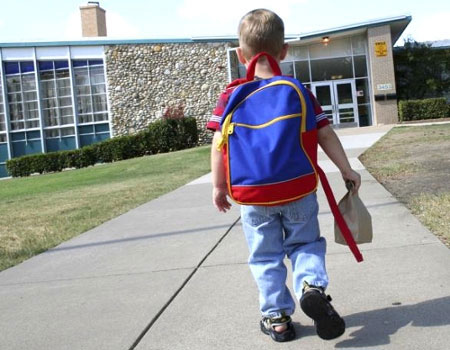The first day of school can be a scary experience for a young child. However, there are some ways to making this process of preparing your child for the school easier. Here are a few ways to help your child adjust When a child begins school, it is a challenging time for both the child and his parent. A child is leaving the safety of his home and will be in unfamiliar surroundings. A parent worries that her child will not be able to manage by himself. Making a smooth exchange between home and school is an important step in a childs life. It determines how much he will enjoy the rest of his school days. Parents have a big role to play in this transition. While all children experience some form of nervousness, the degree of emotion is largely dependent on how their parents prepare them. In this articleBe EnthusiasticPrepare Your ChildEstablish a RoutineSaying GoodbyeBe Enthusiastic Parents do not realise it but their actions subconsciously influence their child as well. Your child is naturally going to be wary of a new place. He does not need you to add to that anxiety. Make sure your child sees that you are excited about him going to school. Also, do not forget to boost your childs confidence. Keep praising him and tell him that you are happy for him. Let him know that he is going to have a great time at school. This goes a long way towards dispelling some of the negative emotions that your child experiences. Prepare Your Child A big part of the nervousness a child experiences is because he does not know what to expect. Separation anxiety is another common feeling, especially for a child who has always had one parent stay at home with him. Get your child used to the idea of being away from you for some time. If possible, have someone else take your child out for some time while you remain at home. Before your child actually starts school, familiarise him with the school settings. Also, arrange for your child to meet his teacher. On beginning school, your child will be calmer because he has already met someone there. You can try something similar even with other students. Find a child who you know is likely to be in the same class, and arrange for him to spend some time with your child. This way, he will have at least one friend in the classroom. Establish a Routine Do not wait until the first day to make your child establish his school routine. Get him to follow the same routine as that when he will begin his school. Start following the new routine around three weeks before the commencement of the school year. Give your child a few small tasks to do such as helping you pack his lunchbox and keeping out the clothes or uniform he is going to wear. In addition, adjust his bedtime accordingly. Your child should be used to getting up and retiring to bed at the same time as when he will be in school. If he suddenly has to adjust to a new sleep schedule, you will find yourself dealing with a very cranky child who does not want to go to school. Saying Goodbye There are plenty of children who are very happy about starting school until the day actually arrives. Then, all of a sudden, they refuse to let go of their parents hands. On the first day of school, set aside a little extra time to say goodbye to your child. While doing so, see that you are friendly yet firm. The idea is to make it clear to your child that even if he whines or becomes clingy, you are not going to give in to him. If your child is upset, your staying back is only going to make it harder for him to finally let go. Preparing your child to begin the academic phase of his life is simply a matter of few days. As a parent, the most important thing you can do is to be patient with your child. Once he adjusts to a new lifestyle, the rest is smooth sailing.
The first day of school can be a scary experience for a young child. However, there are some ways to making this process of preparing your child for the school easier. Here are a few ways to help your child adjust When a child begins school, it is a challenging time for both the child and his parent. A child is leaving the safety of his home and will be in unfamiliar
surroundings. A parent worries that her child will not be able to manage by himself. Making a smooth exchange between home and
school is an important step in a child's life. It determines how much he will enjoy the rest of his school days. Parents have a big role to play in this transition. While all children experience some form of nervousness, the degree of emotion is largely dependent on how their parents prepare them.
Be Enthusiastic
Parents do not realise it but their actions subconsciously influence their child as well. Your
child is naturally going to be wary of a new place. He does not need you to add to that anxiety. Make sure your child sees that you are excited about him going to school. Also, do not forget to boost your child's confidence. Keep praising him and tell him that you are happy for him. Let him know that he is going to have a great time at school. This goes a long way towards dispelling some of the negative emotions that your child experiences.
Prepare Your Child
A big part of the nervousness a child experiences is because he does not know what to expect.
Separation anxiety is another common feeling, especially for a child who has always had one parent stay at home with him. Get your child used to the idea of being away from you for some time. If possible, have someone else take your child out for some time while you remain at home.
Before your child actually starts school, familiarise him with the school settings. Also, arrange for your child to meet his teacher. On beginning school, your child will be calmer because he has already met someone there. You can try something similar even with other students. Find a child who you know is likely to be in the same class, and arrange for him to spend some time with your child. This way, he will have at least one friend in the classroom.
Establish a Routine
Do not wait until the first day to make your child establish his school routine. Get him to follow the same routine as that when he will begin his school. Start following the new routine around three weeks before the commencement of the school year.
Give your child a few small tasks to do such as helping you pack his lunchbox and keeping out the clothes or uniform he is going to wear. In addition, adjust his bedtime accordingly. Your child should be used to getting up and retiring to bed at the same time as when he will be in school. If he suddenly has to adjust to a new sleep schedule, you will find yourself dealing with a very cranky child who does not want to go to school.
Saying Goodbye
There are plenty of children who are very happy about starting school until the day actually arrives. Then, all of a sudden, they refuse to let go of their parent's hands. On the first day of school, set aside a little extra time to say goodbye to your child. While doing so, see that you are friendly yet firm. The idea is to make it clear to your child that even if he whines or becomes clingy, you are not going to give in to him. If your child is upset, your staying back is only going to make it harder for him to finally let go.
Preparing your child to begin the academic phase of his life is simply a matter of few days. As a parent, the most important thing you can do is to be patient with your child. Once he adjusts to a new lifestyle, the rest is smooth sailing.
































